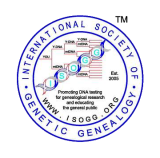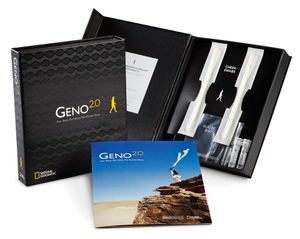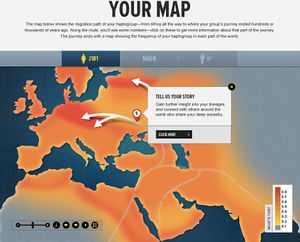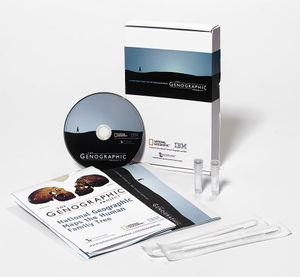Genographic Project
From ISOGG Wiki
(Redirected from Geno 2.0)|
| |
| Industry | anthropology study |
|---|---|
| Founded | April 2005 |
| Founder(s) | National Geographic Society and IBM |
| Headquarters | , USA |
| Products | Genetic test |
| Services | Genetic testing, Online genome service |
| Website | https://genographic.nationalgeographic.com |
The Genographic Project, launched on April 13, 2005 by the National Geographic Society and IBM, is a multi-year genetic anthropology study that aims to map historical human migration patterns by collecting and analyzing DNA samples of people from around the world. The Genographic Project relies on the identification of genetic markers and is undertaking widespread consultation with indigenous groups from around the world.
The project is a privately funded, not-for-profit collaboration between the National Geographic Society, IBM and the Waitt Family Foundation. Part of the proceeds from the sale of self-testing kits support the Genographic Project's ongoing DNA collection, but the majority are ploughed into a Legacy Fund to be spent on cultural preservation projects nominated by indigenous communities.
Field researchers at 11 regional centers around the world collect DNA samples from indigenous populations. Different populations have different genetic markers, and by following them through the generations scientists are able to identify the different branches of the human diversity. Indigenous populations provide geographical and cultural context to the genetic markers in their DNA. These clues help recreate past human migration patterns.
Contents
Geno 2.0 Next Gen Helix Product (US only, November 2016 onwards)
In November 2016 the Genographic Project announced a new US partnership with Helix. US kits are now processed by Helix. International kits are processed by Family Tree DNA.[1][2]
Geno Next Generation (August 2015 onwards)
The Geno 2.0 Next Generation test was launched in August 2015.[3]
Transfer your results to Family Tree DNA
Geno 2.0 Next Generation participants can transfer their Y-SNP, autosomal DNA and mtDNA SNP results to Family Tree DNA where they can participate in Surname DNA projects, mtDNA haplogroup projects, Y-DNA haplogroup projects and geographical DNA projects. The autosomal SNPs on the new Geno chip are compatible with the FTDNA Family Finder database. To transfer results you can use this direct link on the FTDNA website. Alternatively see the instructions on how to transfer Genographic results in the FTDNA Learning Center. The transfer option is no longer available to US customers who have tested through Helix from November 2016 onwards.
Geno 2.0 (fall 2012 - August 2015)
This DNA chip test is specifically designed for anthropological testing and includes SNPs from autosomal DNA, X-chromosome DNA, Y-chromosome DNA and mitochondrial DNA. The design of the new chip was a collaborative effort between Eran Elhaik of Johns Hopkins U., Spencer Wells of National Geographic, Family Tree DNA and Illumina.[4] The testing is done at the FTDNA Genomics Center in Houston, Texas.
The Geno 2.0 test is offered since fall 2012 for $199.95 and requires a simple cheek swab. Orders can be placed through the National Geographic website.
- Focus is deep ancestry (ancient populations).
- for maternal and paternal ancestry a Level of Relation chart is provided showing other kits in the same and near terminal haplogroups. If the other kits do not release adresses in their volunteer ancestry story, there is no possibility to contact those kits.
- Raw data is available for download (detailled analysis, submission to researchers)
- Transfer of results from National Geographic to FTDNA (deep SNP results)
- the DNA chip is a Illumina HD iSelect genotyping bead array: concordance with the 1000 Genomes data of over 99.5%. The GenoChip has a SNP density of approximately (1/100,000) bases over 92% of the human genome and is highly compatible with Illumina and Affymetrix commercial platforms.
autosomal DNA - X-DNA
- Over 130,000 autosomal and X-chromosomal Ancestry Informative Markers, derived from over 450 populations around the globe (Reference population data will eventually be downloadable)
- Biogeographical estimate (ethnicity)
- Ancient population estimate with over 25,000 SNPs from candidate regions of interbreeding between extinct hominins (Neanderthal and Denisovan) and modern humans
- Does not predict relatives and family relationships (revealed by 23andMe, Family Finder etc.)
- Claims to avoid medical information (only selected SNPs)
Y-DNA
- 12,316 Y-SNPs[5]: reported are over 6,153 SNPs already in a New Tree and ~10,000 novel Y-SNPs, information will be available at GP and FTDNA (via Thomas Krahn's ytree and database). In Nov. 2012 6,535 Y-SNPs names are known by ISOGG and 2,083 out of them are included in Geno 2.0. Out of the 2,083 most are used in ISOGG haplogroups and the rest researched in them.[6]
- SNP sources:
CTS 3,286 from Chris Tyler-Smith (Wellcome Trust Sanger Institute) primarily from 1K Genomes data;
F 2,990 from Li Jin (Fudan University) discovered by deep sequencing in East Asian populations from a variety of haplogroups;
PF 4,023 from Paolo Francalacci and Sergio Tofanelli by deep sequencing in Sardinian populations from a variety of haplogroups.
The rest are drawn from the ISOGG tree (Z), FTDNA (L), Underhill (M), Hammer (P) and other available sources.
Most Y-DNA information should be available to males with paternal ancestry from Sardinia, Tuscany, England, Scotland, Finnland, Iberia, North and Western Europe (CEU), East Asia, China/Han, China/Dai, Japan/Tokyo, Vietnam/Kinh, Nigeria/Yoruba, Kenya/Luhya, Gambia, Sierra Leone/Mende, Nigeria/Esan, African American, African Caribbean, Mexican Californian, Puerto Rico, Colombia, Peru/Lima, India/Gujarati, Pakistan/Punjabi, Bangladesh/Bengali, Sri Lanka/Tamil, India/Telegu, WTY clusters. - Initially reported Cutoff on Y-SNPs was roughly Nov. 2011 (ca. L850, Z285);
At the release in Dec. 2012 Y-SNPs are included up to: DF84, L809, M526, P330, PAGES00131, U290, V250, YSC0000301, Z1892;
newer SNPs (DF, L, Z, etc.) will be included in a future update;
not all "known" Y-SNPs will be available (can not be typed on the chip). - Deep-clade (likely terminal) Y-DNA haplogroup assignment, ~431 Y-Haplogroups included, does replace the current FTDNA Deep Clade tests
- No replacement of Y-DNA Marker tests (does not include Y-STRs) for near paternal relationships and clustering (surname projects)
mtDNA
- 3,352 mtDNA SNPs
- Deep-clade mtDNA haplogroup assignment
- Does not replace the full mitochondrial sequence (FMS) test which sequences the entire mitochondrial genome (16,569 SNPs) and will allow you to refine your subclade assignment as new subclades are discovered and published on www.phylotree.org
Comparison with Family Finder, 23andMe, etc.
For comparison and better evaluation to other similar SNP-chip products see Autosomal DNA testing comparison chart. Detailed analysis of the autosomal and X chromosome SNPs in Geno 2.0 and comparison with the SNPs used in FTDNA's Family Finder and 23andMe's v2 and v3 tests by Tim Janzen: post on the Genealogy DNA mailing list dated 30 January 2013.
News articles
- The Genographic Project Launches Geno 2.0, Blaine Bettinger, The Genetic Genealogist, July 25th, 2012
- National Geographic and Family Tree DNA Announce Geno 2.0, CeCe Moore, Your Genetic Genealogist, July 25, 2012
- A Short Update from Spencer Wells on Geno 2.0, CeCe Moore, Your Genetic Genealogist, July 30, 2012
- National Geographic – Geno 2.0 Announcement – The Human Story, Roberta Estes, DNAeXplained– Genetic Genealogy, July 25,2012
- Geno 2.0 – Q&A with Bennett Greenspan, Roberta Estes, DNAeXplained – Genetic Genealogy, July 26, 2012
- National Geographic announces new DNA test, Emily Aulicino, DNA - Genealem's Genetic Genealogy, July 25, 2012
- The Genographic Project: on to the autosome!, Razib Khan, Gene Expression, July 25, 2012
- Ancestry SNPs galore, Debbie Kennett, Cruwys news, July 26, 2012
- Geno 2.0, WTY, mtDNA Full Sequence Participants, and More, Roberta Estes, DNAeXplained– Genetic Genealogy, 31 July 2012
- The GenoChip: a new tool for genetic anthropology, Abstract Presentation AJHG meeting session, Nov. 2012
- Official Press Release: National Geographic unveils new phase of Genographic Project 4 December 2012
Geno 2.0 reviews
- Genographic Project 2.0 first look! by CeCe Moore, 21 November 2012
- More on Geno 2.0: Third party resources and images from a second set of results by CeCe Moore, 30 November 2012
- First look @ Geno 2.0 beta results by Dave Dowell, 10 December 2012
- National Genographic 2.0 Results Received by Blaine Bettinger, 11 December 2012
- My Geno 2.0 results step by step by CeCe Moore, 12 December 2012
- Geno 2.0 results: Kicking the tires by Roberta Estes, 12 December 2012
- Genographic results from the UK by Debbie Kennett, 12 December 2012
- Geno 2.0 - the website by Emily Aulicino, 16 December 2012
- Genographic Project results by Alasdair Macdonald, 7 January 2013
What to do with your results
Transfer your results to Family Tree DNA
Geno 2.0 participants can transfer their Y-SNP and mtDNA SNP results to Family Tree DNA where they can participate in Surname DNA projects, mtDNA haplogroup projects, Y-DNA haplogroup projects and geographical DNA projects. To transfer results you can use this direct link on the FTDNA website. Alternatively see the instructions on how to transfer Genographic results in the FTDNA FAQs. See also the blog post by Roberta Estes on Transferring Results from National Geographic to Family Tree DNA.
Raw data - additional analysis
By downloading Geno 2.0 raw data, as explained on this page, Geno 2.0 Raw Data, you can use the data with Admixture analyses and Autosomal DNA tools. The Y-chromosome SNPs can be used for Y-DNA haplogroup research (see below).
Haplogroup analysis
Chris Morley has developed a Y-SNP subclade predictor which can be used on raw Geno 2.0 data. Given a set of Y-SNP calls the tool will (i) predict the subclade, (ii) show the phylogenetic placement (when available) of reported SNPs, and (iii) identify unplaced positive SNPs. It can use either the ISOGG tree or the author's experimental tree as the basis for classification. See also the author's report An experimental computer-generated Y-chromosomal phylogeny, leveraging public Geno 2.0 results and the current ISOGG tree.
Contribute and participate in Y-DNA haplogroup research
Citizen scientists are collecting the raw Y-SNP data from Geno 2.0 tests in an attempt to establish the position of the many new Y-SNPs on the Y-SNP tree. Results are being collected for most of the major haplogroups and subclades. A list of all the known projects is provided below. In addition Itaï Perez is maintaining a spreadsheet of Geno 2.0 results from all the haplogroups. Further information can be found in the Geno 2.0 Y-DNA SNP Comparison website or in the Geno 2.0 Y-DNA SNP Comparison Facebook group.
Haplogroup A
- Bonnie Schrack is collecting Geno 2.0 Y-SNP results for haplogroup A. Submissions should be sent to
.
Haplogroup B
- Aaron Brown is collecting Geno 2.0 Y-SNP results for haplogroup B. Submissions should be sent to
.
Haplogroups C and D
- Ray Banks is collecting Geno 2.0 Y-SNP results for haplogroups C and D. Submissions should be sent to
.
Haplogroup E
- Aaron Brown is collecting Geno 2.0 Y-SNP results for haplogroup E. Submissions should be sent to
.
Haplogroup G
- Ray Banks, the administrator of the haplogroup G project, is collecting haplogroup G Geno 2.0 Y-SNP results. Submissions should be sent to
.
Haplogroups I1 and I2
- Terry Robb is collecting Geno 2.0 Y-SNP results for haplogroups I1 and I2. Submissions should be sent to
Haplogroup J1
- Victar Mas, Admin of J1 Project, is collecting Geno 2.0 Y-data for haplogroup J1. Submissions should be sent to
.
- Tim Janzen, Admin of J-Project, is collecting Geno 2.0 Y-data for haplogroup J1. Submissions should be sent to
.
Haplogroup J2
- Tim Janzen, Admin of J-Project and J2-M172 Haplogroup Research, is collecting Geno 2.0 Y-data for haplogroup J2-M172. Submissions should be sent to
.
- Angela Cone, Admin of J2-M172 Haplogroup Research, has been collecting Y-data for all clades of J2-M172 except J2a-L24. Submissions should be sent to
.
Haplogroup J2a
- Chris Rottensteiner, Admin of J-Project, J2-M172 Haplogroup Research and J2a-PF5197 Haplogroup Research, is collecting Geno 2.0 Y-data for all clades of J2a-M410 except J2a-L24. Submissions should be sent to
. Results of the research is published at figshare, constant updates on Google Drive and MolGen-Forum. Interested researchers can ask for Google Drive access to research files.
- Al Aburto, Admin of J-L24 Project, is collecting Geno 2.0 Y-data for J2a-L24. Submissions should be sent to
.
Haplogroup K
- Gareth Henson is collating Geno 2.0 Y-SNP results for haplogroup K. Submissions should be sent to
.
Haplogroup L
- Gareth Henson is collating Geno 2.0 Y-SNP results for haplogroup L. Submissions should be sent to
.
Haplogroup M
- Gareth Henson is collating Geno 2.0 Y-SNP results for haplogroup M. Submissions should be sent to
.
Haplogroup N
- Vladimir Volkov is collecting Geno 2.0 Y-SNP results for haplogroup N. Submissions should be sent to
Haplogroup O
- Gareth Henson is collating Geno 2.0 Y-SNP results for haplogroup O. Submissions should be sent to
.
Haplogroup Q
- David Dowell is collating Geno 2.0 Y-SNP results for haplogroup Q. Submissions should be sent to
.
Haplogroup R1a-M417
- Michał Milewski is collecting Geno 2.0 data for haplogroup R1a-M417. Submissions should be sent to
. Some of the data can be seen in a Google Docs spreadsheet. The new draft R1a1a tree incorporating findinds from the Geno 2.0 test can be found here. It is also available on the project's results page. For further information on R1a-M417 see the R1a1a and Subclades Project.
Haplogroup R1b-L21
- David Reynolds is collating Geno 2.0 Y-SNP results for R1b-L21. Details of his project and how to send in files can be found at http://daver.info/geno. A spreadsheet summarising the results can be found at http://daver.info/WTY/R-L21.pdf.
- Robert Casey has provided a high-level technical overview of Geno 2.0 from the L21 perspective at http://www.rcasey.net/DNA/R_L21/HowTo/Nat_Geo_2pt0_Summary.html.
Haplogroup R1b-S28
- Steve Gilbert is collating Geno 2.0 Y-SNP results for R1b-S28. Submissions should be sent to
.
Haplogroup R1b-U106
- Ask for advice on the U106 Yahoo mailing list.
R1b-DF49/DF23/M222
- Paul Conroy is collecting Geno 2.0 results for DF49, DF23 and M222. Submissions should be sent Ato
.
Haplogroup S
- Gareth Henson is collating Geno 2.0 Y-SNP results for haplogroup S. Submissions should be sent to
.
Haplogroup T
- Gareth Henson is collating Geno 2.0 Y-SNP results for haplogroup T. Submissions should be sent to
.
Genographic Project 2005-2012
In the first phase of the project self-testing kits were sold for US$99. The kits were available worldwide. A mouth scraping (buccal swab) was obtained and analyzed, and the DNA information placed on an internet-accessible database. The genetic markers on mitochondrial DNA (Hypervariable region 1) and Y-chromosomes (12 microsatellite markers and haplogroup-defining single-nucleotide polymorphisms) are used to trace the participant's distant ancestry, and each customer is provided with their genetic history. Public participation kits were processed by Family Tree DNA (FTDNA) using the Arizona Research Labs at the University of Arizona. As of July 2012 about 520,000 people have participated. The kits where able to join in FTDNA public projects.
What to do with your results
The non-profit organization MitoYDNA is accepting results from the first phase of the project, and provides a suite of tools where users can find Y and mitochondrial DNA matches across platforms, and learn about the ancient origins of their direct paternal and maternal lines. There is no charge for transferring data or for use of the analytic tools.
News articles
- Tracing humanities roots, Business Week, 13 April 2005 {broken link}
- "Finding the roots of modern humans", CNN, 14 April 2005.
- "'Genographic Project' aims to tell us where we came from", USA Today, 17 April 2005
- "Indigenous Peoples Oppose National Geographic", Indigenous Peoples Council on Biocolonialism, 13 April 2005.
- "Tracking the Truth", DB2 Magazine (IBM), information about IBM's role in the project. December 2006.
- Genographic Success Stories
- "Crusaders left genetic legacy", BBC News, 27 March 2008
- "Human Line 'Nearly split In Two", BBC News, 24 April 2008
- Shnayerson, Michael. The map of us all. National Geographic Adventure; Washington Vol. 7, Iss. 6, (Aug 2005): 78,80,82-83,89-90.
Videos
- An introduction to the Genographic Project
- Nat Geo Live: NG Live!: The Human Journey
- Spencer Wells talks about the Genographic Project and the human family tree on Ted Talks
- The Genographic Project on the US TV programme the Today Show in November 2005. On the show the TV journalists Matt Lauer, Al Roker, Katie Couric and Ann Curry had their DNA tested through the Genographic Project and their results were explained by the Genographic Project director Spencer Wells.
Official sites
- Genographic Project, official site at National Geographic
- IBM Genographic Project, official site at IBM
- The Genographic Project on Twitter
Supporting participants
References
- ↑ Kennett D. Exome testing combined with a Geno 2.0 Next Generation test from Helix. Cruwys News, 23 November 2016.
- ↑ Genographic Project .FAQ: Participation, Testing, and Results. Where are the DNA samples processed?.
- ↑ Vilar M. What is Geno 2.0 Next Generation?. 22National Geographic Voices, 12 Augudt 2015.
- ↑ Elhaik E, Greenspan E, Staats S, Krahn T, Tyler-Smith C, et al. The GenoChip: a new tool for genetic anthropology. Letter. Genome Biolology and Evolution. First published online May 9, 2013.
- ↑ According to the Y-SNP list from file 2012-12-12
- ↑ According to SNP List maintainer David Reynolds (Compendium XLS 2012-12-04)
Licence
| This article is licensed under the GNU Free Documentation Licence. It uses material from the Wikipedia article "Genographic Project". |



